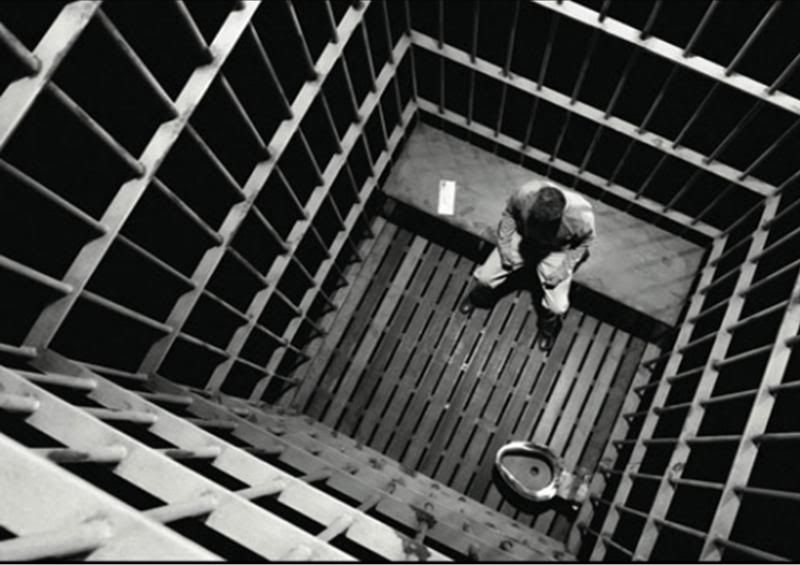Few will argue that there are not sexually dangerous prisoners who should not see the light of day. Due to lax laws, lenient judges and a corrupt judicial system, all manner of criminals are let loose upon society after their sentences are over to continue their deviant ways.
But today's supreme court decision that federal officials can indefinitely hold inmates considered "sexually dangerous" after their prison terms are complete could be setting the stage for 'indefinite detention' and 'preventive detention' of prisoners of all sorts, including political ones.
Could this ruling eventually be applied and approved by the courts under the guise of 'predictive behavior' for so called thought crimes and opposition to the status quo? Who would be the 'experts' that decide that even though a person's sentence is complete, they cannot be let out? The possibilities for abuse are many. To think that there aren't those in the federal government that would use these types of rulings for political repression would be naive.
The high court reversed a lower court decision that said Congress overstepped its authority in allowing indefinite detentions of {those} considered "sexually dangerous."
"The statute is a 'necessary and proper' means of exercising the federal authority that permits Congress to create federal criminal laws, to punish their violation, to imprison violators, to provide appropriately for those imprisoned and to maintain the security of those who are not imprisoned by who may be affected by the federal imprisonment of others," said Justice Stephen Breyer, writing the majority opinion.
President George W. Bush in 2006 signed the Adam Walsh Child Protection and Safety Act, which authorized the civil commitment of sexually dangerous federal inmates.
The act, named after the son of "America's Most Wanted" television host John Walsh, was challenged by four men who served prison terms ranging from three to eight years for possession of child pornography or sexual abuse of a minor. Their confinement was supposed to end more than two years ago, but prison officials said there would be a risk of sexually violent conduct or child molestation if they were released.
A fifth man who also was part of the legal challenge was charged with child sex abuse, but declared incompetent to stand trial.
The 4th U.S. Circuit Court of Appeals in Richmond, Va., ruled last year that Congress overstepped its authority when it enacted a law allowing the government to hold indefinitely people who are considered "sexually dangerous."
But "we conclude that the Constitution grants Congress legislative power sufficient to enact" this law, Breyer said.
Justice Clarence Thomas dissented, saying Congress can only pass laws that deal with the federal powers listed in the Constitution.
Nothing in the Constitution "expressly delegates to Congress the power to enact a civil commitment regime for sexually dangerous persons, nor does any other provision in the Constitution vest Congress or the other branches of the federal government with such a power," Thomas said.
Thomas was joined in part on his dissent by Justice Antonin Scalia.
Chief Justice John Roberts last year granted an administration request to block the release of up to 77 inmates at a federal prison in North Carolina. These were people whose prison terms for sex offenses were ending. The justice's order was designed to allow time for the high court to consider the administration's appeal.
The Adam Walsh Child Protection and Safety Act also establishes a national sex offender registry, increases punishments for some federal crimes against children and strengthens child pornography protections. Those provisions are not being challenged.
State laws allowing civil commitments of sex offenders also are unaffected.
The case is U.S. v. Comstock, 08-1224.source: Washington Examiner
At the arguments in January, Solicitor General Elena Kagan {Supreme Court nominee} said the power to confine such prisoners was implicit in the government's duty "to run a responsible criminal justice system." The law aims "to make sure that sexually dangerous, mentally ill people don't fall through the cracks between federal custody and the re-establishment of state control," she said. {more}
Would Kagan be predisposed to call political dissent a mental illness if it suits her and her handlers agenda?
The ultimate agenda goes well beyond the sexually dangerous.
Now independent thinkers are considered diseased by psychiatry
The new edition {of the Diagnostic and Statistical Manual of Mental Disorders (DSM)} may include "disorders" like "oppositional defiant disorder", which includes people who have a pattern of "negativistic, defiant, disobedient and hostile behavior toward authority figures."{more}







No comments:
Post a Comment